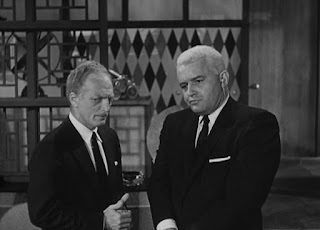Notable Cast: Jack
Palance, Ida Lupino, Wendell Corey, Jean Hagen, Rod Steiger, Shelley Winters,
Ilka Chase, Everett Sloane, Wesley Addy, Paul Langton, Nick Dennis, Michael
Winkelman, Strother Martin
“I’m a deductible item. They write me off in the books!”
Perhaps the biggest thing that plays against The Big Knife is that it was released the
same year as Robert Aldrich’s iconic film Kiss
Me Deadly. While the former is not nearly as strong as the latter, for some
reasons I’ll dig into here in a second, it’s not a film that should be as
forgotten from the cinephile mainstream as it has been with time. It’s flawed,
yes, but The Big Knife is also a film
that provides a rather cynical and vicious look into the dark side of 1950s
Hollywood ideals with its character study and dialogue focused framework that
shines in its small details. It’s a film that may not interest the more casual
film fan, but it’s a film that deserves to be viewed again with the brilliance
of hindsight and this Arrow Academy release provides the perfect setting to do
so. It’s one more moment where Arrow finds those hidden classics of cinema and
brings them back into the light and with a film like The Big Knife it just
might kick start a new found appreciation for a cult classic.
 |
| Marriage isn't part of the contract. |
On the other hand it seems intentional by Aldrich and his
team. The film is about a big shot Hollywood star, played with dynamic screen
presence by Jack Palance, who has become cornered, in many ways, by a tragedy
and his own career that’s tearing apart his marriage and his life. The audience
rarely sees his character outside of his house and there’s a sense of that
entrapment by the limited settings and how he’s surrounded by possessions that
never seem to be his in a house where people, his friends and foes (or both?)
just meander in and out with little regard to his own privacy or feelings. Not
only do we get the idea that this large, imposing man (again, casting Palance
is a brilliant move here) is losing power, but he’s losing his own sense of
self to those around him. It’s paralleled by his wife, who also seems as lost
as him, and the struggling moral moments of his friends and peers which is
perhaps highlighted by a sequence where he meets up with a fellow actress
signed to the same studio who deliriously delivers the quoted line at the
beginning of the review with a frantic and spastic tone. The Big Knife is not
so much of a noir about femme fatales and murder mysteries as it is a film
about the loss of life to the system and the powers around that see a person not
as a person, but as a product.
 |
| Collusion is part of the contract. |
Still, even with its heavy handed anti-Hollywood elements
and slow burning, long takes that drag on a bit too long, The Big Knife is a film where it’s uneasiness and tension truly
highlight the nihilistic tones and dark, depressing character work with
relative ease. It’s a film that’s a bit hard to digest for more casual film
goers and certainly pales in comparison to Aldrich’s other 1955 classic, but it’s
also a film that deserves a bit more credit than it tends to receive. It has
some phenomenally dynamic performances, the nuanced dialogue is sharp, and the
final 15 minutes can be a real shock for those invested in the film. Arrow
Academy has pulled another great gem out of the past and brought it into the
present with this slick new Blu Ray release and while it doesn’t have a lot of
features, the commentary is a nice touch though, it will be a fantastic edition
to those cinephile’s collections of more obscure classics.
- Brand-new 2K restoration from original film elements produced by Arrow Films exclusively for this release
- High Definition Blu-ray (1080p)
- Original English mono audio uncompressed LPCM
- Optional English subtitles for the deaf and hard-of-hearing
- Commentary by film critics Glenn Kenny and Nick Pinkerton, recorded exclusively for this release
- Bass on Titles Saul Bass, responsible for The Big Knife s credit sequence, discusses some of his classic work in this self-directed documentary from 1972
- Theatrical trailer
- Reversible sleeve featuring original and newly commissioned artwork by Sean Phillips
- FIRST PRESSING ONLY: Illustrated collector s booklet featuring new writing on the film by Nathalie Morris




No comments:
Post a Comment